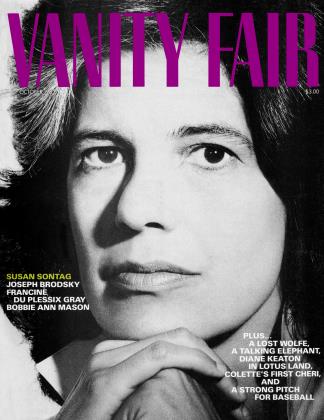Sign In to Your Account
Subscribers have complete access to the archive.
Sign In Not a Subscriber?Join NowThe Liveliest Arts This Month; Previews, Reviews, and Overviews
THE BIG CHILL, directed by Lawrence Kasdan (Columbia), should be calledThe Big Swill.Lapsed longhairs reunite to swap hallucinogens, one-liners, partners, and banalities. Unwitting proof that the '60s made no difference.. .LONELY HEARTS, directed by Paul Cox (Samuel Goldwyn), is an AustralianMarty, but without the poetry-of-thecommon-man pretensions, and it grows quietly devastating as it observes the grubby pain of singles who don't know from swinging...
MOVIES
UNDER FIRE, directed by Roger Spottiswoode (Orion). We're in Nicaragua during the last days of the Somoza regime, and we're also in the thick of a romantic triangle: TV newsman Gene Hackman, his journalist lover Joanna Cassidy, and news photographer Nick Nolte. Director Roger Spottiswoode never achieves the dreamlike chaos of Missing or The Dogs of War, but the script is complex and knowing, and you soon feel you're peering into the bubbling depths of a political volcano. Unfortunately, the movie is also about how Nolte and Cassidy fall in love and become radicalized, surrendering their unbiased-journalist posture to aid the Sandinista cause. Not only does this ideological flip-flop prove unconvincing (it has something to do with meeting a nice Sandinista who likes baseball), it's also rather offensive. Is journalistic integrity really so ignoble? Is it less virtuous than manufacturing propaganda? This movie compares Nolte's firm objectivity with the stance of a wildeyed American mercenary, a thug who doesn't care what side he's on as long as he's well paid. Luckily, that mercenary is played bv Ed Harris, and he manages to wipe everyone else off the screen, partly because he's such a gung ho creep and partly because the other characters are outlandishly tough-talking smarties who don't seem to need anybody else— not friends, not lovers, not even the audience. —STEPHEN SCHIFF
NEVER CRY WOLF, directed by Carroll Ballard (Walt Disney). In Carroll Ballard's films, visual beauty is more than just decoration or tacked-on lyricism. It's the source of the drama itself. Adapted from Farley Mowat's eloquent memoir of a season spent observing wolves in the Arctic Circle, Ballard's Never Cry Wolf uses the stripped-down northern landscapes—fierce-looking rivers, caribou herds, ominous frozen seas—as other films use character and incident. They're storytelling elements: you hurtle from one startling image to the next, propelled by a sort of accelerating awe. Like the first half of The Black Stallion, Ballard's only other feature, Never Cry Wolf is ravishing in a direct, effortless way that makes you feel you're glimpsing new worlds beneath the luminous surfaces of things. Sinewy trees bear messages of warning or welcome, wolves proffer silent advice, patterns of clouds or thawing rivulets seem coded, on the verge of becoming decipherable. (It's as though one were watching a literal demonstration that beauty is truth.) And yet Ballard never gets all drippy and religious on us; the sights and sounds in Never Cry Wolf are always wedded to the scientific pursuits of its biologist hero, played by Charles Martin Smith. With his nerdy matter-of-factness and his piping, nattering voice (a dead ringer for Wallace Shawn's), Smith makes thunderstruck wonder seem reasonable, even logical—the only sensible response to this extraordinary confluence of animals and Eskimos, ice and sky. —S.S.
STEPHEN SCHIFF
ENTRE NOUS, directed by Diane Kurys (United Artists Classics). An intelligent, meticulously detailed study of an obsessive friendship (between timorous Isabelle Huppert and wanton Miou Miou), and yet it leaves you cold. Diane Kurys, who made Peppermint Soda and Cocktail Molotov, specializes in committing childhood memories to film, and though her recall is perfect, this movie cries out for an opinion, a moral evaluation, a glimmer of the director's presence: in short, a point of view. —S.S.
IURPLE HAZE, directed by David Burton Morris (Triumph Films), is more '60s schlock. And hell no, we won't go.
 View Full Issue
View Full Issue












Subscribers have complete access to the archive.
Sign In Not a Subscriber?Join Now